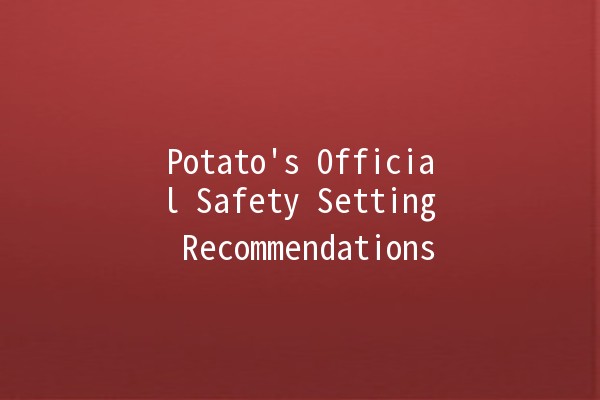In today's digital age, ensuring the security of your devices, software, and data is crucial. For users of the Potato platform, adhering to proper safety settings is essential to safeguard personal information and enhance the overall user experience. Here, we'll cover the necessary recommendations for configuring your Potato platform settings, emphasizing five effective productivity enhancement techniques that align with best safety practices.
Importance of Safety Settings
Understanding why safety settings are vital is the first step toward effective digital security. Safe settings help protect personal data, prevent unauthorized access, and enhance user experience by reducing the risk of breaches or technical issues. Regularly updating and configuring these settings ensures that users can leverage their devices' full capabilities without compromising personal safety.
Recommended Safety Settings for Potato Users
TwoFactor Authentication (2FA) adds an extra layer of security by requiring not only a password but also a secondary method of verification. This method drastically reduces the risk of unauthorized access.
Description: 2FA typically involves sending a verification code to your registered mobile number or email when a login attempt is made from an unrecognized device.
Practical Application Example:

How to Enable: Navigate to the security settings on your Potato account. Select the twofactor authentication option and follow the prompts to link your mobile device. Whenever you log in from a new or unrecognized device, a code will be sent to your mobile, ensuring you verify your identity.
Passwords act as the primary defense against unauthorized access. A robust password strategy can significantly boost your account security.
Description: A strong password includes a mix of letters, numbers, and symbols, making it more challenging for potential intruders to guess or crack.
Practical Application Example:
Creating a Strong Password: Combine random words, numbers, and symbols. For instance, instead of using "Potato123", use something like "P0t@t0s2#Secure". Consider utilizing a password manager to store and generate unique passwords for different accounts securely.
Keeping the Potato platform and associated applications up to date ensures you have the latest security patches and features.
Description: Software updates often include important security fixes that address vulnerabilities and enhance functionality.
Practical Application Example:
How to Update: Enable automatic updates in your Potato application settings. Check for updates regularly if manual updates are preferred. Regularly update accompanying apps that interact with your Potato platform to ensure compatibility and security.
Understanding and adjusting your privacy settings can help control who can access your information on the Potato platform.
Description: Privacy settings allow users to limit the visibility of their information and manage permissions for apps and services.
Practical Application Example:
Adjusting Privacy Settings: Go to your Potato account settings, navigate to privacy options, and review datasharing settings. Disable features that allow thirdparty applications to access your data unless absolutely necessary. You can also change visibility settings on your profiles to control who can see your posts or personal information.
Regularly checking your account activity helps you recognize any unauthorized access attempts or suspicious behavior quickly.
Description: Monitoring alerts you to any unusual or unexpected activity on your account, allowing for prompt action.
Practical Application Example:
How to Monitor: Check your Potato account's activity log, usually found in the security settings. Look for any unfamiliar logins or changes made to your account. If you see anything suspicious, change your password immediately and log out from other devices.
Frequently Asked Questions
Twofactor authentication provides an additional layer of security that helps protect your account even if your password is compromised. By requiring a second form of verification, it minimizes the risk of unauthorized access.
To create a stronger password, combine uppercase and lowercase letters, numbers, and special characters. Use at least 12 characters and avoid common words or easily guessable information. A password manager can assist you in generating and remembering complex passwords.
If you suspect unauthorized access, immediately change your password and enable twofactor authentication if you haven’t already. Check your account activity log, and if you notice transactions or changes you didn’t make, contact Potato’s support team for assistance.
It’s recommended to review your security settings at least once every three months or whenever there are significant updates to the applications or the Potato platform. Always update after a security breach or suspicious activity.
Yes, reputable password managers use strong encryption, making your passwords safe. However, ensure you use a trustworthy password manager and enable its builtin security features, such as twofactor authentication.
Yes, you can easily adjust your privacy settings on the Potato platform. If you change your mind, simply return to the privacy settings section of your account and update the visibility options as per your preference.
By implementing these safety settings and maintaining a proactive approach to digital security, Potato users can enjoy a safer, more efficient experience. Regular monitoring, combined with strong passwords and effective privacy controls, will significantly enhance your account's security. Follow these guidelines to put your best foot forward in maintaining the integrity of your personal information.
Embrace the power of Potato while staying secure! 🥔🔒